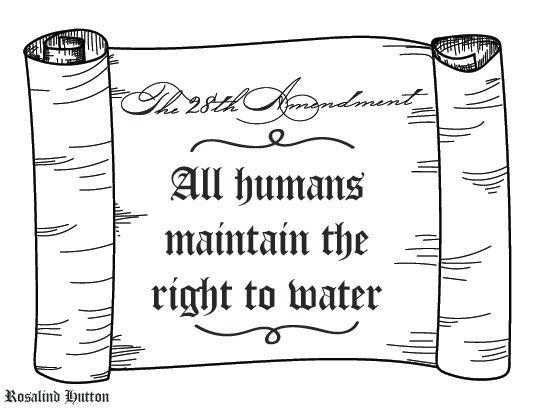Water is a renewable resource, and our bodies need it to survive. Although the Earth is roughly 71% of water, not every human being has access to clean water. This is unacceptable considering the human body can only survive a week without water and nearly 60% of the human adult body is made of water. I believe water should be regarded as a basic human right, and we should be doing more to protect the water we have.
According to Water.org, nearly 785 million people worldwide, or 11% of the world’s population, do not have access to an improved water source. This lack of water affects the quality of life in more ways than you may think. For example, the lack of water negatively impacts our bodies’ health and hygiene because our bodies require water to survive. It also perpetuates poverty among people by causing them, mostly women and children, to spend more time working to get water when they could otherwise be in school or working to earn more money. The lack of access to water also causes many unnecessary deaths, especially among those with underdeveloped immune systems. According to the Centers for Disease Control and Prevention, unsafe drinking water, inadequate availability of water for hygiene and lack of access to sanitation contribute to about 88% of deaths from diarrheal diseases. An estimated 801,000 children younger than five years of age perish from diarrhea each year, mostly in developing countries.
If countries began to truly work to provide safe and clean water for all of their citizens, we could greatly decrease these deaths and help provide a better life for its people. The World Health Organization recently predicted better access to safe drinking water and improvements in sanitation and hygiene could prevent 9.1% of diseases worldwide, which is would equate to preventing 6.3% of all deaths.
According to NRDC.org, the United Nations General Assembly voted in 2010 to recognize the right to safe and clean drinking water as a human right; however, countries must only try to provide water, and it is not considered a human rights violation that 785 million people do not have access to safe, clean water. In fact, the United States and 40 other countries abstained from the UN vote to recognize access to water as a human right. With issues like climate change and industrial pollution increasing, the possibility of a water crisis or clean water shortage increases every day, and any nation, whether underdeveloped or wealthy, can be affected by it. This can cause diseases to arise from contaminated water, especially once it has spread between humans and wild animals. Although our government makes many efforts to conserve non-renewable resources such as fuel and coal, water should also be valued just as much, especially considering how necessary it is for human survival.
It is imperative we work hard to keep our waters clean and make sure every human has access to clean, safe water for the sake of our planet and our health. Since water is in everything we eat and place in our bodies, we should be more cautious about how we contaminate it, as well as neglectfully allow humans to drink unsanitary water. Our governments should be held accountable for making sure water is and remains safe to drink while also making sure it is accessible to everyone.
Categories:
Access to water should be a human right, not a luxury

Water is human right
0
Donate to The Reflector
Your donation will support the student journalists of Mississippi State University. Your contribution will allow us to purchase equipment and cover our annual website hosting costs.
More to Discover





